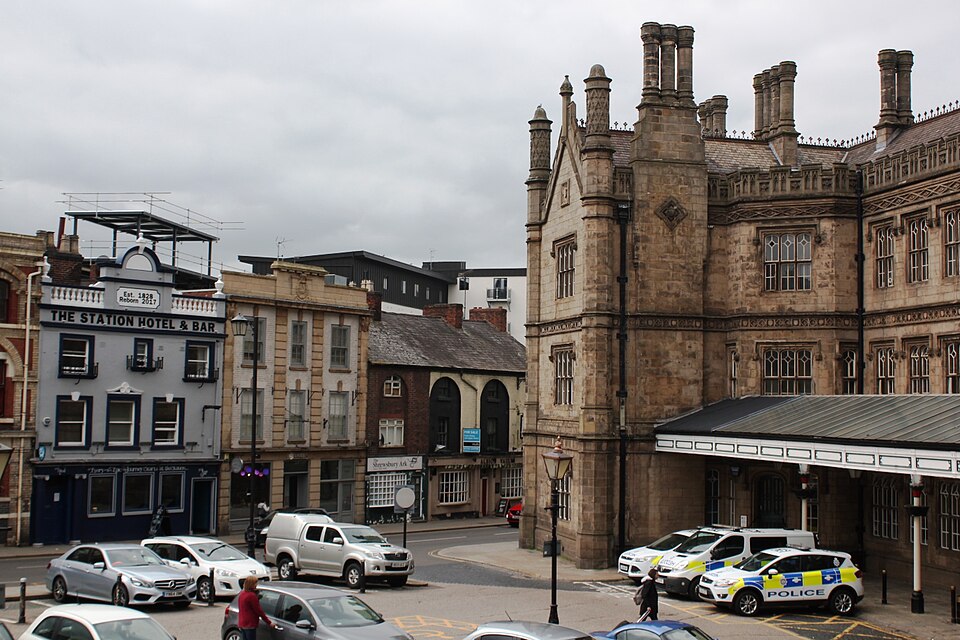
In a sweeping nationwide crackdown, police have raided 265 businesses across England and Wales—including barbershops, mini-marts, and vape stores—suspected of being fronts for
international crime gangs.
One such raid took place in the quiet market town of Shrewsbury. Officers stormed a sleek, modern barbershop, detaining two men, later identified as Kurdish asylum seekers. Though both were released, police seized thousands of pounds in cash and illicit vapes. The shop was being investigated for suspected money laundering, illegal immigration, and links to drugs and illicit tobacco sales.
Detective Inspector Daniel Fenn, leading the raid, questioned how such establishments could claim earnings of £100,000 to £150,000 per month. “They don’t get the footfall to justify those numbers,” he said, citing CCTV footage from other shops with few customers.
The raids were part of Operation Machinize, an initiative launched by the National Crime Agency (NCA) in response to rising intelligence reports linking certain High Street shops—often Turkish-style barbers or vape shops—to organized crime. Many of these businesses have opened in areas where legitimate shops have closed, raising public suspicion.
In Greater Manchester and West Mercia, the operation uncovered:
- A cannabis farm with over 150 plants
- Heroin, testosterone vials, nitrous oxide, Xanax, and a machete
- 35 arrests and 55 suspected illegal immigrants questioned
- Three potential modern slavery victims identified
- Bank accounts and assets worth over £1 million frozen
- £40,000 in cash seized
In one instance, a mini-mart in Rochdale concealed dozens of boxes of illegal tobacco in hidden compartments. Officers said some staff were working illegally, with asylum seekers from Iraq, Iran, and Kurdistan commonly found behind the counters.
Despite often operating in plain sight for years, this is the first time law enforcement, tax officials, immigration officers, and Trading Standards have joined forces in a coordinated response.
DI Melanie Johnson from Greater Manchester Police expressed frustration over the unsustainable concentration of barbers and mini-marts on local High Streets. “As a parent, I want my kids to grow up in a safe, vibrant community—not one overshadowed by criminal activity,” she said.
Police found some businesses claimed huge incomes despite being behind on bills, like a £7,000 unpaid gas bill at the Shrewsbury shop. Many were sparsely furnished, with signs of people living above the premises in makeshift accommodations.
Trading Standards officer Dennis Chalmers pointed out that businesses often vanish as soon as enforcement arrives, only to reopen under new names. "It’s like a revolving door,” he said, noting the difficulty in tracking down real owners when employees don't even know their names.
The NCA estimates around £12 billion is laundered through the UK annually, with some of it flowing through these suspect businesses. Rachael Herbert, NCA’s deputy director of economic crime, emphasized the impact: “Money laundering enables some of the most violent and harmful crimes on our streets.”
One London-based Kurdish barber, Hewa Rahimpur, was previously convicted for running a criminal operation that smuggled 10,000 people into the UK via small boats.
Meanwhile, legitimate barbers are calling for licensing and tougher enforcement. Gareth Penn from the Hair and Barber Council warned of public health risks, including fungal infections from unsanitized equipment.
Despite the raids, only 10 businesses have been shut down so far. Most reopened shortly after police left. In Rochdale, officers watched a man believed to be restocking shelves with illicit tobacco just hours after a raid.
Security Minister Dan Jarvis said the operation highlights the “scale and complexity” of organized crime embedded in everyday communities. But with many shops bouncing back quickly, authorities now face the challenge of targeting the criminal networks behind these operations and putting an end to the exploitation hiding behind seemingly ordinary storefronts. Photo by Geof Sheppard, Wikimedia commons.




































